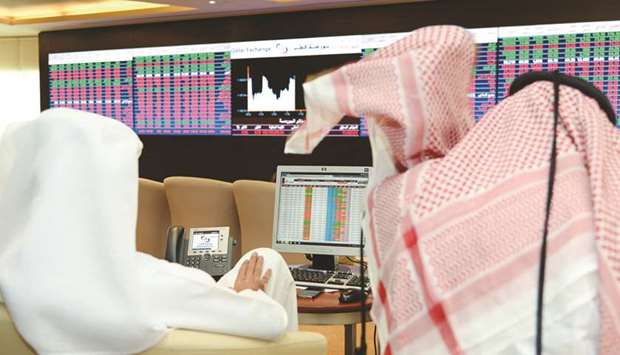Non-Qatari and Gulf individual investors turned bullish yesterday amidst a marginal weakening in the Qatar Stock Exchange.
Gainers outnumbered losers even as the 20-stock Qatar Index fell 0.11% to 9,583.78 points.
Industrials and consumer goods counters witnessed robust demand in the market, whose year-to-date losses were seen at 8.17%.
Islamic stocks were seen gaining vis-à-vis declines in main index and other indices on the bourse, which was also helped by weakened net selling by local retail investors and Gulf funds.
After an initial weakening, the market touched near 9,600 points within first 10 minutes, after which there was profit booking pressure that led it to touch a low of about 9,540 points. The latter part largely saw bullish trend with occasional dips and buying was seen stronger especially in the last few minute. But, overall the index settled 11 points lower.
Micro and large cap segments saw some buying in the market, which, however, saw bearish outlook of foreign institutions and lower buying support from their domestic counterparts.
Market capitalisation was down 0.07% to QR519.28bn as small and midcap stocks fell 0.46% and 0.13%, while micro and large caps gained 0.05% and 0.04% respectively.
Trade turnover and volumes were on the decline in the bourse, where telecom, banking, industrials and real estate sectors together accounted for more than 88% of the total volumes.
The Total Return Index fell 0.11% to 16,071.43 points and All Share Index by 0.1% to 2,726 points, while Al Rayan Islamic Index rose 0.2% to 3,821.32 points.
The industrials index gained 0.39%, consumer goods (0.36%) and telecom (0.02%); whereas insurance fell 1.91%, realty (0.29%), transport (0.13%) and banks and financial services (0.05%).
Major gainers included Vodafone Qatar, Industries Qatar, Doha Bank, Commercial Bank, Qatar General Insurance and Reinsurance, QIIB, Masraf Al Rayan, Qatar National Cement, Qatar Electricity and Water, Aamal Company, Mazaya Qatar, Nakilat, Al Khaleej Takaful, Qatari German Company for Medical Devices and Al Meera.
Nevertheless, Qatar Insurance, QNB, Qatar Islamic Bank, al khaliji, Ooredoo, Gulf Warehousing, Barwa, United Development Company, Qatari Investors Group, Gulf International Services, Mesaieed Petrochemical Holding and Widam Food were among the losers.
Non-Qatari retail investors turned net buyers to the tune of QR9.42mn compared with net sellers of QR3.65mn the previous day.
The GCC (Gulf Cooperation Council) individuals were also net buyers to the extent of QR0.06mn against net sellers of QR5.54mn on July 25.
The GCC institutions’ net profit booking declined substantially to QR1.22mn compared to QR11.81mn on Tuesday.
Local retail investors’ net selling also weakened influentially to QR19.94mn against QR27.46mn the previous day.
However, non-Qatari institutions turned net sellers to the tune of QR0.08mn compared with net buyers of QR12.67mn on July 25.
Domestic institutions’ net buying declined considerably to QR11.76mn against QR35.78mn on Tuesday.
Total trade volumes fell 20% to 6.18mn shares, value by 38% to QR199.62mn and deals by 35% to 2,812.
There was 78% plunge in the transport sector’s trade volume to 0.17mn equities, 55% in value to QR7.71mn and 63% in transactions to 195.
The consumer goods sector’s trade volume plummeted 62% to 0.41mn stocks, value by 66% to QR41.78mn and deals by 58% to 426.
The industrials sector reported 33% shrinkage in trade volume to 1.12mn shares, 38% in value to QR35.03mn and 38% in transactions to 430.
The insurance sector’s trade volume tanked 16% to 0.16mn equities and value by 13% to QR10.12mn, while deals grew 19% to 137.
The banks and financial services sector saw 7% decline in trade volume to 1.48mn stocks, 16% in value to QR60.02mn and 31% in transactions to 813.
However, the real estate sector’s trade volume soared 26% to 1.11mn shares, value by 35% to QR23.02mn and deals by 36% to 588.
The market witnessed 12% expansion in the telecom sector’s trade volume to 1.74mn equities but on 2% fall in value to QR21.93mn and 35% in transactions to 223.
In the debt market, there was no trading of treasury bills and government bonds.

QSE

